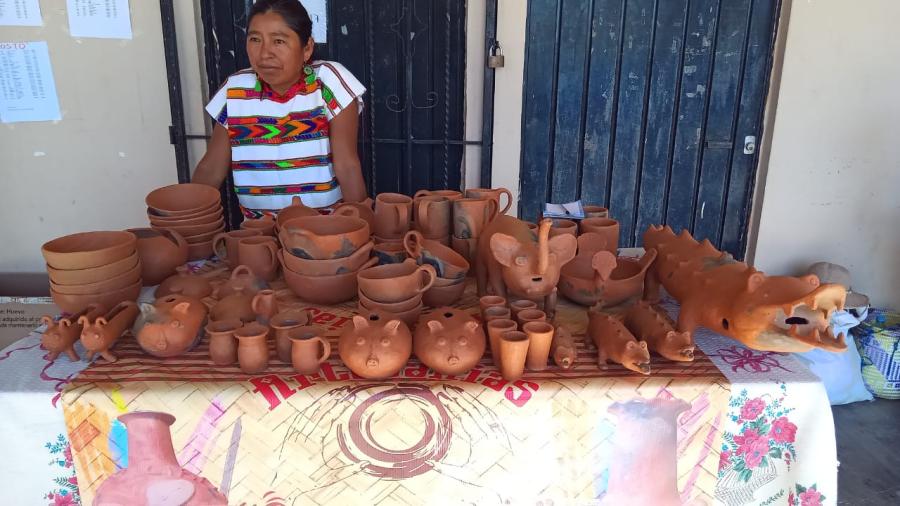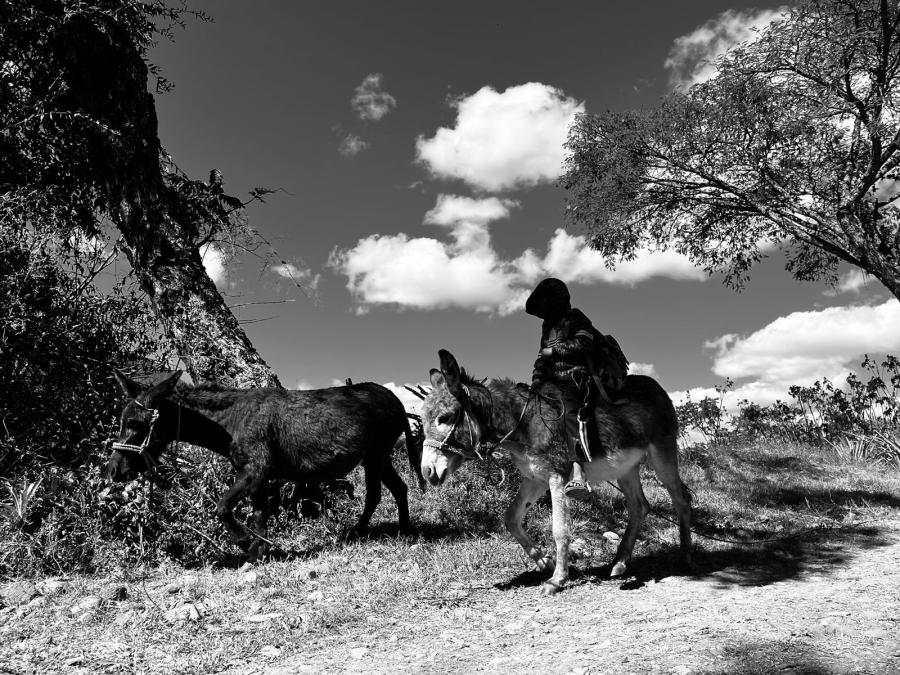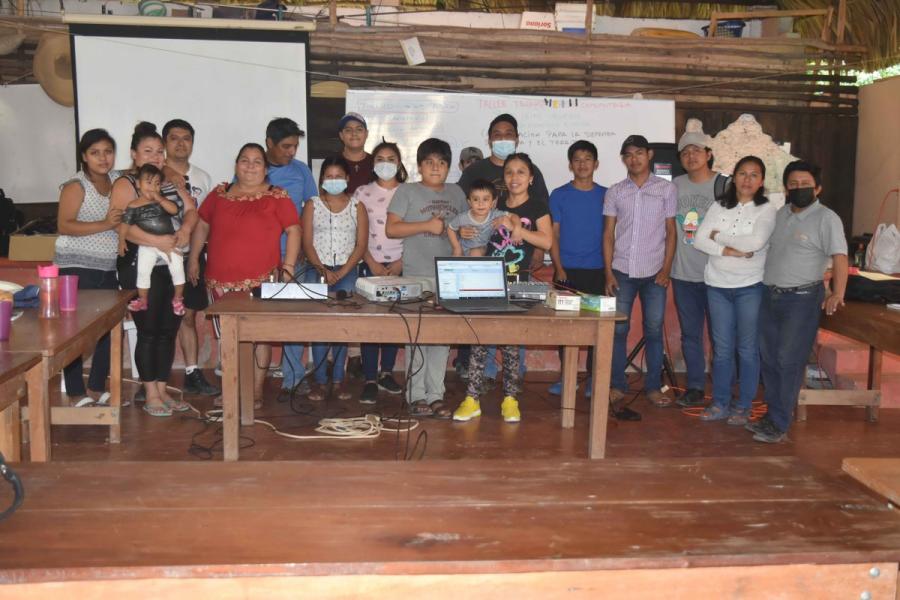By Micaela Icó Bautista and Susannah Daniels
The Organization of Indigenous Doctors of Chiapas (OMIECH) was formed in 1985 by Tsotsil, Tseltal, and Ch'ol Mayan health promoters and traditional doctors. Our objective is to revive, defend, systematize, disseminate, develop, and practice traditional Mayan medicine. The Women and Midwives Section of OMIECH is made up of 51 traditional midwives from 4 municipalities and 8 communities of the Highlands, Northern, and Selva regions of Chiapas, Mexico. We implement community workshops that are attended by midwives, healers, and herbalists, members of OMIECH; in addition to women, men, and children. These workshops in the Indigenous communities strengthen the exchange and transmission of the knowledge and practices of our own traditional midwifery, between midwives, within each family and community, and at the regional level. We discuss and reflect upon topics, including: maternal death, care during pregnancy, birth and post-partum, care of newborn infants, family planning with plant medicine, Indigenous women and adolescence, women's rights, and the conservation and defense of medicinal and nutritional plants and animals, among others. In recent years, our work has focused on developing strategies to stop the public policies that threaten the survival of traditional Indigenous midwifery in Mexico. The following is a portrait of a traditional Tsotsil midwife, narrated by the Women and Midwives Section's Coordinator, Micaela Icó Bautista.
As young girls, traditional midwives (in the Tsotsil language jtamoletik) dream that they will be midwives. God (in Tsotsil Kajvaltik, Jtotik, Ch’ul totik ta Vinajel, Ch'ulme'tik ta Ch'ul Balumil) gives us a sign through our dreams. He/She gives us the materials we will use. We learn from our dreams and by attending the births of our own children. We also learn from more experienced midwives, our grandmothers, mothers, and others.
When a woman seeks us out, it is our duty to give her advice. Depending on the patient, whether she is ill, tired, or malnourished, we will see what she needs. She should eat well, eat leafy greens, whatever she has, whatever there is to eat. If she has no appetite, if her heart is telling her not to eat, we must explain to her that she has to eat so that she may be strong and healthy, and so that the baby is happy and develops well, without complications. We also talk to the husband. We say to him: “Listen, take care of your wife. If she doesn't feel like eating, sit and eat with her. Ask her what she has a craving for. We hear about women who die, of babies who die. This happens when women are not eating, when couples fight a lot, when husbands scold their wives, the woman becomes sad and doesn't feel like eating. We have to prevent complications. Help your wife, take care of her."
Some midwives are also healers (in Tsotsil j'iloletik “she/he who sees beyond”). Healers are able to communicate directly with their patient's spirit. They diagnose their patients by feeling their pulse. In this way, a healer can determine whether a woman has a problem, for example, with her husband or if she is not eating. This diagnostic is important, because some women do not want to tell us when they have problems.
During a pregnancy, we have to ask for the protection of our patient three times. The healer knows how to perform her ritual, depending on whether there is envy, if an evil spirit entered her patient. In her prayer, the she speaks to both the woman and the baby, so that the latter will come into the world in a good way. And, she speaks to God. Prayer is used to protect our patient and prevent problems. Midwives who are not healers, also know how to pray and ask for protection for their patient. And even when the midwife is of another religious faith, she also asks for her patient's protection. There is only one God. There is no other. The woman also has to speak with God so that all may go well in her pregnancy. She has to speak to Him/Her, deliver herself to Him/Her, every day. One cannot forget to do this.
By the fourth month of pregnancy we can tell whether the baby is well positioned. We massage the woman whenever she needs it, depending on how she feels. And in this way, we monitor our patient until her pregnancy is full-term. Sometimes the mother or the baby is rebellious. We correct the baby's position and within no time it has moved again. This has meaning for us campesina women. When a baby is malpositioned it is because we set down our firewood without untying the tumpline, or because we left the batten in a crooked position on our loom. The baby copies what we do in our day to day tasks. He doesn't feel good. He can't get comfortable and has to seek out a place where he is content. This is why midwife-healers perform both "the secret" and pray. They have different ways of performing ''the secret'' so that the baby will remain in the right position.
What we want is for women to come see us at the beginning of their pregnancy. This is for the benefit of both them and their family. Some midwives, we go from village to village to see the mothers who are going to give birth. This is why our work is important for women, our communities, and ourselves. We prevent maternal deaths. There are medicinal plants not only for treating and managing complications, but also for preventing them.
When some women go into labor, they suffer a lot of pain because ''aire'' or coldness has entered their body. We lay them down on a petate (straw mat), check their stomach, warm it and massage it, and the pain goes away. When the baby is almost crowning, we put a faja (wide woven belt) around the mother's waist, she squats down and we help her. If the baby is a little malpositioned, you have to a get a firm hold on his shoulder and hand, and then, from the outside, turn his body in a circular motion and get him into a good position. In some cases, we put vegetable oil on the woman's ''part'' so that the baby will slide out more easily. When the child is born we sit with it next to the fire and bathe it in lukewarm water. We lay the umbilical cord on a corncob and cut it with a small piece of reed. If the placenta does not come out, the mother should be given the tail of a tlacuache. First, we toast the tail on the comal, then ground it, and then stir it into a cup of boiled water.
After the birth, we boil a tea of pepper, cloves, and ginger. This tea is very good for decreasing postpartum bleeding and for cleaning and warming the uterus. If a midwife knows how to use the sweat lodge (in Tsotsil pus), this is good for women. It warms their uterus and returns it almost to its original size. The mother should take care of herself for two or three months, and she should not drink cold water because the medicine is hot.
We midwives know about plant medicine. We acquired this knowledge through dreams. Through our dreams, God gave us our material for healing. He/She placed it in our hands, our heart, and our mind. The sacred plants are very powerful. They did not grow on their own, rather, they have a guardian/provider: the sacred earth. They have spirits, just as the healer, the herbalist (in Tsotsil ac'vomoletik), and the midwife have spirits. When a person does not know the plant, it's because she has not been introduced to it in her dreams. In dreams, we learn about where it grows and its uses. If you do not dream about how to talk to the plant, then there is no communication. For this reason, not just anyone can use the plants, only those who have this power, or ability. Midwives sow and harvest plants and they store them in their home pharmacies. But they do not harvest them at just anytime. There's a secret to this. The healers say that if you have faith, you can use plant medicine. But if you deny the plant's power, it's as if you are mocking it. It's just like a person. If you have ''two hearts'', if you do not trust in the plant, it will not heal you. Likewise, it is important that a woman trust her midwife, so that there are no complications during her pregnancy and birth.
In our organization, OMIECH, we exchange knowledge with other midwives. Sometimes we meet with other midwives and women in our communities. Other times, we go to San Cristóbal de Las Casas to meet with midwives from other communities and municipalities. These meetings are very important because we learn about how other midwives care for the patients and what plants they use. They are also important because they encourage us and give us strength. Because, although the women in our communities continue to seek out our services, there are not very many traditional midwives left. This is because the government and the Health Sector increasingly find ways of forcing us to receive training in clinical medicine. In these training sessions, they teach us that the knowledge passed down to us by our ancestors is useless, that our medicine is useless, that pharmaceuticals are better, that we shouldn't even touch our patients to massage them, and that it's better to send them to the hospital. This is leading to high rates of cesarean sections in Mexico. These surgeries only benefit the pharmaceutical companies that supply hospitals with the medicine and equipment used for obstetric care. The more women who seek care in hospitals, the richer these companies become, while our own traditional Indigenous midwifery dies out. And if this happens, who will attend our granddaughters’ pregnancies and births? For this reason, we will continue to demand that the government respect our knowledge and customs, and fight to ensure that our own form of midwifery continues to be valued and practiced in our communities.
Organization of Indigenous Doctors of Chiapas (OMIECH) is a Keepers of the Earth Grant Partner.
-- Micaela Icó Bautista (Tzotzil), born in 1959, originally from San Andrés Puerto Rico, municipality of Huixtán, began to train as a community health promoter by the National Indigenous Institute (INI) at the age of 17. In 1981, she began her work as a defender of traditional Mayan medicine. She is co-founder of the Organization of Indigenous Doctors of the State of Chiapas (OMIECH), where she has worked since 1985 as Coordinator of the Area of Women and Midwives.
Susannah Daniels is originally from Silver Spring, Maryland. She has lived in San Cristóbal de Las Casas, Chiapas, Mexico since 2004. She earned her doctoral degree in Mesoamerican Studies at the UNAM in 2018. She has worked as a volunteer with the Women and Midwives Section of OMIECH since 2014 and has conducted research on topics including the history of Indigenous women’s organizing in Chiapas and Mayan women’s theater.



